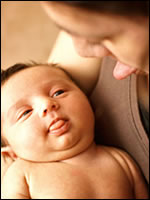The mainstream media are reporting that the side on which mothers cradle their babies may be linked to maternal depression (Foxnews, The Telegraph). First, there’s the background to the story and second I explain why this study has been misrepresented. The Guardian writes:
“New mothers who cradle their infants on the right side of their body may be displaying signs of “extreme stress”. The findings build on previous research showing that most mothers prefer to hold their baby to their left, regardless of whether they are left- or right-handed.
The study suggests there is a correlation between the minority who hold a baby on the right and a greater likelihood that they are experiencing stress beyond the levels natural in new parents.”
It is accurate that there is a finding from previous research that (non-stressed or depressed) mothers tend to cradle their babies to the left. Further, it has been found previously that depressed mothers have a tendency to cradle their babies to the right.
Flat contradiction of previous work
Unlike the write-up in The Guardian (and elsewhere) it’s not mentioned that this study (published online in the Journal of Child Psychology and Psychiatry) does flatly contradict previous work in one important respect. As the authors themselves point out, previous research found that depressed mothers hold their babies on the right, in opposition to this, the current study found depressed (but not stressed) mothers showed a bias towards the left – which is the way all mothers show a preference for holding their babies.
This is somewhat covered up by focussing on the fact that ‘stressed’ and depressed mothers tend to hold their babies to the right.
Not mentioning the contradiction significantly reduces the impressive media spin on the story. This is that doctors may be able to tell if mothers are depressed from the side on which they hold their baby. Even if this were a useful marker, the fact that the studies are contradictory is evidence that further work needs to be done.
The second point to note about this study is that it is based on a small number of participants (79). Since these were then split into four categories – and most mothers were not depressed – that doesn’t leave many in some of the categories. In fact as few as 6 in the ‘only depressed’ category. That is low.
While this study is really interesting, there’s obviously some way to go yet – something that is fully acknowledged by the authors of the study but totally glossed over in the mainstream media reports.
Read the study’s abstract

